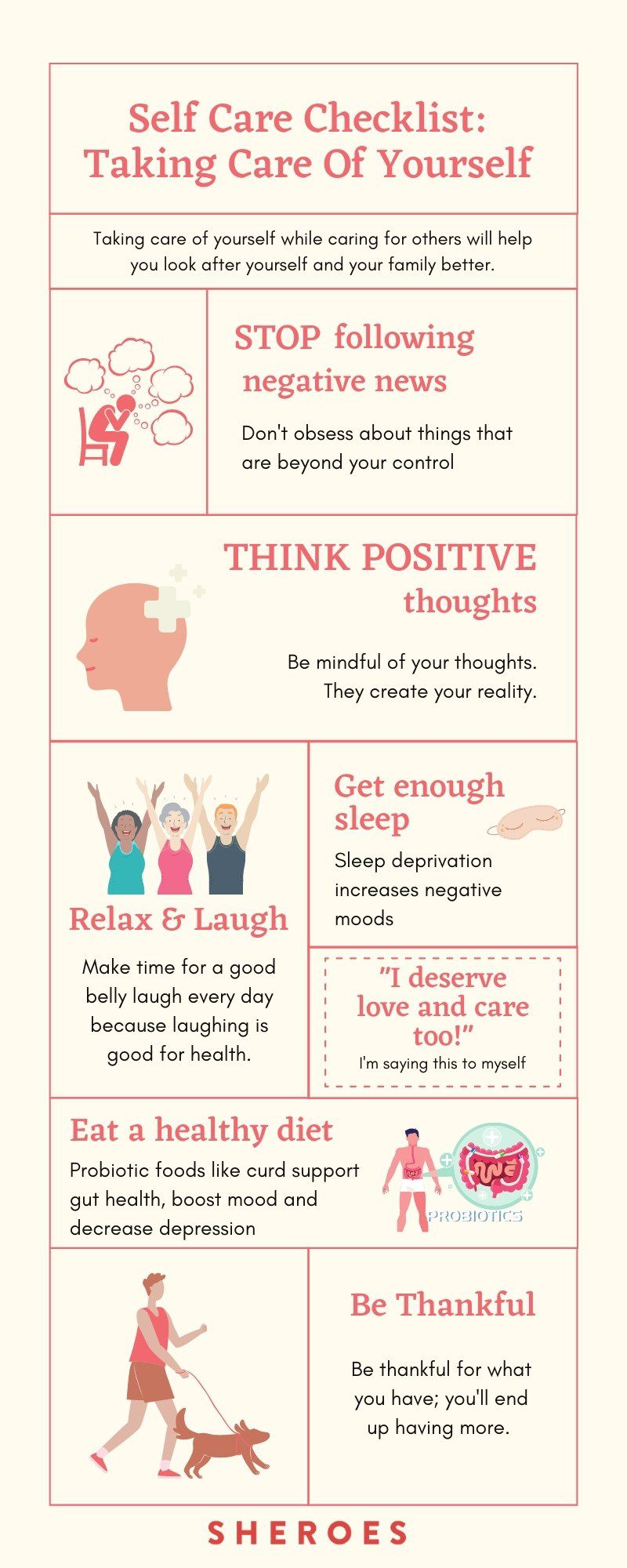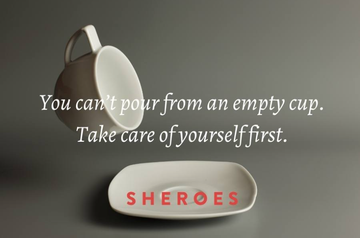Self Care For Women: Taking Care Of Yourself While Caring For Others
Practicing self-care for women is absolutely essential. Taking care of yourself while caring for others will help you look after yourself and your family better.
If you’ve been taking care of family and ailing elders during the pandemic, you’ll know how stressful it can be. Perhaps you feel taking care of myself is not possible when there are others who need me.
In that case, the best self care tip is to remember the wise saying:
“You can’t pour from an empty cup. Take care of yourself first.”
Quarantine self care and emotional self care for moms are critical, especially when you’re caring for others in your family who are sick or in poor health.
In this article, you’ll find tips for practicing self care at home and taking good care of yourself when you’re nursing others back to health.
1. Stop following negative news
I know, it seems strange to tell someone to stop following negative news when you need to know what the situation is and whether or not there will be a lockdown.
But if you watch the news channels all day, you’ll know that they just love to focus on negative news and repeat the worst of it all throughout the day.
Research has shown that increased consumption of predominantly negative news can result in harmful psycho-physiological responses in some people. If you focus on bad news all day, you’ll end up with depression and anxiety.
Just remember that what’s happening in the outside world is beyond your control and it doesn’t help to obsess about things you have no control over. When the world seems to be falling apart, it helps to focus on the things you can control in your own life.
For example, if you enjoy cooking, focus your energies on cooking healthy and nutritious meals for your family. Find fun activities for kids at home and use this opportunity to spend time bonding with your family.
For the sake of your mental health, the best psychological self care practice is to shift your focus from negative news to positive news - and there are always people who are doing good and helpful things in the world.
Social media can be another source of bad news that you don’t need to read about. Most of us spend too much time doomscrolling – which is the act of spending an excessive amount of screen time devoted to the absorption of negative news.
That doesn’t mean you have to disown your entire family on social media. But I found that curating my social feed, hiding posts from news sites, and unfollowing people who were spreading negativity was the best mood-lifting self-care practice for me.
2. Choose better-feeling thoughts
There are many ways to boost your mood, but one of the most powerful ways to improve mood and mental health is to choose better-feeling thoughts.
As an example, let me tell you the story of Viktor Frankl, the Austrian neurologist, psychiatrist, philosopher, author, and Holocaust survivor.
As the story goes, in 1942, just nine months after marrying his wife, Frankl and his family were sent to the Theresienstadt concentration camp. His father died there of starvation and pneumonia.
In 1944, Frankl and the surviving members of his family were taken to Auschwitz, where his mother and brother were gassed. Even when he was in the Nazi concentration camps, Frankl never lost hope of meeting his wife, not realizing that she died of typhus in Bergen-Belsen.
After he was released, he wrote the book, Man's Search for Meaning, describing his psychotherapeutic method, which involved identifying a purpose in life to feel positive about, and then imagining that outcome.
According to Frankl, the way a prisoner imagined the future affected his longevity. He concluded that no matter what life experiences we confront, we always have the inner-freedom to decide our attitude.
As one of his most famous quotes goes:
Everything can be taken from a man but one thing: the last of the human freedoms — to choose one’s attitude in any given set of circumstances, to choose one’s own way.

He also said, “When we are no longer able to change a situation, we are challenged to change ourselves.” This means no matter how bad things seem, you always have the ability to CHOOSE your thoughts and attitudes about it.
So when the world seems to be falling apart, you can choose to either think thoughts of despair or thoughts of hope. Which thoughts will you choose?
3. Start a gratitude journal
One of the best ways to think positive thoughts and improve mood is to focus on good things in your life. The most effective way to do this is to start a gratitude journal and write down a list of things in your life you are grateful for.
If you’re depressed and cannot think of anything good to write down, start with the most basic things, such as:
· I am grateful that I have clean air to breathe
· I am grateful that I have clean water to drink
· I am grateful to have food on my table
· I am grateful that I have a home to live in
· I am grateful to have people I love in my life
And so on…
As you continue this gratitude practice, you’ll think of even more things to appreciate in your life. The more you focus on things to appreciate, the more things you’ll have to appreciate.
As this great quote by Oprah Winfrey goes:
“Be thankful for what you have; you'll end up having more. If you concentrate on what you don't have, you will never, ever have enough.”

4. Eat a healthy diet
Did you know that your diet can play a huge role in lifting your mood? In fact, there are a number of nutrients that can help improve mood.
Research has found that bacteria in our gut produce serotonin, a mood-boosting chemical. In fact, 90% of your body’s serotonin is produced in your gut, so a healthy gut may correspond to a good mood.
Studies have found that consuming probiotic foods - including fermented foods like curd or yoghurt, kimchi, kefir, kombucha, and sauerkraut - can support gut health, boost mood and improve symptoms of depression.
Other self-care vitamins and foods you can consume for a better mood are:
· Omega-3 fatty acids
· Bananas
· Oats
· Berries
· Nuts and seeds
· Beans and lentils
· Coffee
Getting all your essential vitamins and nutrients will not only boost mood but also help increase immunity and fight off infection.
If you feel you may not be getting all of the nutrients you need from your diet, you can buy natural health products and supplements in the SHECO marketplace.
5. Get enough sleep
There is a correlation between sleep and mood as studies show people who are sleep deprived report increases in negative moods (anger, frustration, irritability, sadness) and decreases in positive moods.
Many patients with chronic sleep problems also have mood disorders and insomnia is often a symptom of mood disorders like depression and anxiety.
Long term sleep deficiency can also increase the risk of chronic health problems such as heart disease and diabetes.
There are many natural remedies and health supplements for sleep disorders but you can also use meditation as a natural sleep aid.
This 10-step meditation for sleep will help you let go of thoughts, frustration, tension and tightness and allow you to drift to sleep freely.

6. Relax and laugh
In addition to these tips for daily self-care for women, make sure you also set aside personal self-care time to relax, have fun and do the things you love.
Studies show that laughter can relieve stress, improve your mood, help you relax, reduce pain by activating the release of endorphins (the body’s natural painkillers), and generate an overall sense of well-being.
In addition, laughter boosts immunity, lowers bad cholesterol and systolic blood pressure, and boosts good cholesterol (HDL). So, make time for a good belly laugh every day because laughing is good for health.
Self-love and self-care are essential for your physical and mental well-being. So, don’t feel guilty about taking care of yourself, and teach your family to help out when you need a self-care day.
In the long run, prioritizing yourself and taking care of yourself first will help improve your mood and enable you to look after yourself and your family better.
Also read:
- 8 Simple and Natural Ways to Improve your Immunity
- 10 Foods to Boost your Immunity
- 10 SHECO Health And Wellness Brands To Support Your Health & Vitality

















